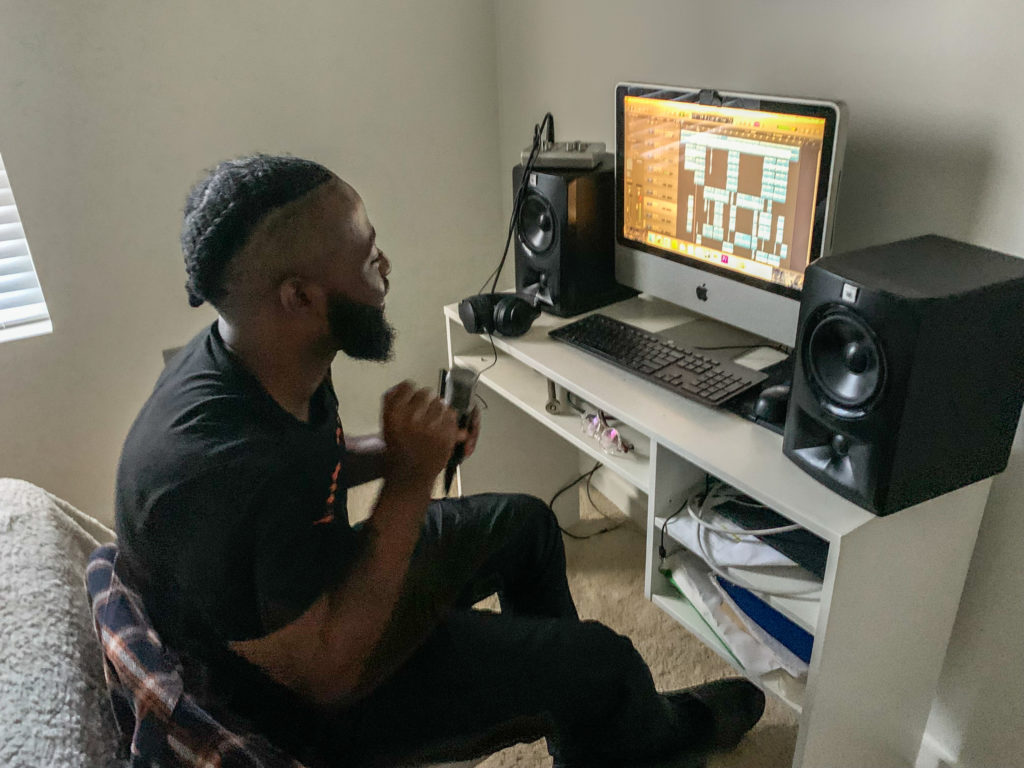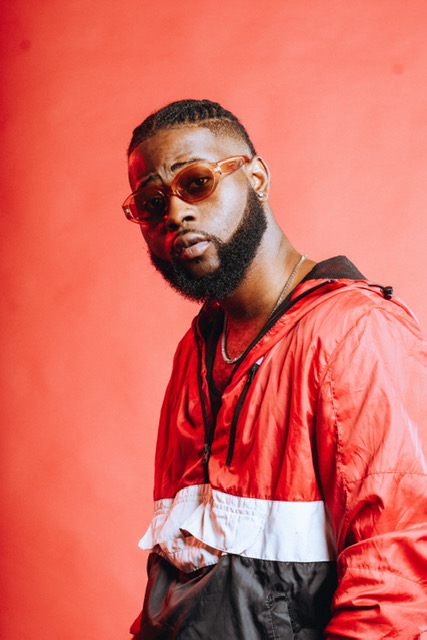Mic o lays out his mentality in the title track of his new Aura EP: “Bad vibe, I jump over it.”
He’d sound just as convincing if he swapped out the slightly forceful verb “jump” and boasted about floating, gliding or sliding over negativity instead. The Nashville-based Afrobeats artist excels at smooth talk, smooth singing and smooth moves, including the suave slide-in he picked up from Usher’s repertoire as a teenager.
During his Nigerian childhood, Mic o — born Michael Oruma — danced to Afrobeats for friends who hyped him up at parties and lent his voice to praise songs and choir solos for congregants at the church his family attended. He tried combining the two, styling himself as “the Usher of gospel,” after following his medical doctor father to Nashville and attending Lipscomb for half of high school and a bit of college, where a pre-country-pop-fame Kelsea Ballerini was a classmate.

Mic o eventually decided that his heart wasn’t in gospel, that it was time to stop bending over backward to dress up his sensual expression as though it was purely devotional. He titled one of his first secular projects African Lover, and he’s expanded his approach in sleek, new directions on Aura.
Over tracks shaped by several different Nigerian producers — some based in his country of origin, others in Atlanta and all deft at blending the electronic and the organic — Mic o is fluent, his gestures unforced. His bilingual vocals are lithe and reedy, favoring silken ornamentation over flamboyant runs and flowing between crooned, Auto-Tuned-glossed verses, mellow hooks and near-rapping. He’s got a well-developed feel for contemporary R&B’s proximity to pop, dance and hip-hop, and the sophisticated, polyrhythmic overlap between Afrobeats, Jamaican dancehall and other innovations of the African and Latin American diasporas. That allows him to coolly calibrate his posture from track to track, from the swaggering self-belief of “Aura” to the seductive defiance of “Bad Boy” and, during “Spell,” feigned helpless in the face of infatuation.
Mic o’s other big project in 2022 was launching an Afrobeats festival in Nashville, an event that he dubbed Attahville. That’s how intent he is on introducing his adopted city to his culture, his global ambitions and his music’s power to please.
AUDIO TRANSCRIPT:
Host intro: Nashville is home to countless home studios where musicians sit at their computers and tinker with their tracks. Mic o completed parts of his new Aura EP, WNXP’s Record of the Week, with just such a bare-bones setup. Only, the suave, sinuous Afrobeats sounds he shapes set him apart from most of his music-making neighbors.
After spending his childhood in Nigeria, he moved here a decade ago to finish high school, and got into recording. Until he launched an Afrobeats festival in a downtown park this year, he’d only found platforms elsewhere. Now Mic o’s intent on connecting with Nashville, and he welcomed senior music writer Jewly Hight into his apartment studio for this proper introduction.
Mic o: It’s supposed to be a guest room. It’s just a little setup where I kind of create like my demos and do some recordings, you know, create ideas, songwriting and stuff. I’m just opening it up right now. [typing sounds as he accesses the recording session for the song “Aura” on his computer]
[MUSIC] M-i-c-o baby/It’s your boy Mic o
M: The voice is a little bit raw, you know?
Jewly Hight Did you use that mic, like, holding it in your hands? Without a stand?
M: Yeah. So actually, that’s the thing that people don’t understand about music. You can really create anywhere and use whatever you have to make a good song.
So I think it’s actually amazing that I live in Nashville, Tennessee and I do Afrobeats, because of course, we all know Nashville, Tennessee as country music. Music City.
My mom didn’t want me to do secular music, so she told me, if I’m going to do music, it has to be in church. I used to, like, change the lyrics of secular music to gospel. When you try to flip a secular song into a Christian song, it’s usually very, very corny. You know, instead of talking about a girl, you’re talking about God.
So my mom used to tell me not to go out a lot when I was a kid [in Nigeria]. But I used to sneak out a lot to go to parties. When I go to these parties, I used to dance for them, and the music we were listening to was Afrobeats.
When I first came here [to Nashville], I did music, but I wasn’t taking it serious. I started taking it serious when I started realizing what city I was in and how almost everybody here has a studio. I started making friends with a bunch of my friends that had studios, just learning how to set it up, how to record myself. I was making all these songs and sending them to a bunch of labels, trying to see if somebody would call me back or something. But I wasn’t getting nothing back, so I was like, “You know what? The best thing for me to do is to do it myself.”
M: My old gospel music is on YouTube. [laughs] I still haven’t taken them down, because I feel like that was a part of me. But it’s embarrassing.
When I was starting to think about my future and all that. I was trying to decide, “Is this [gospel music] really me? Is this letting me be my authentic self?”
Since 2017, I’ve been going to Atlanta. Every college [there] has an African [students] association and every African association, they usually have fashion shows or end of the year galas or something, and they have like thousands of people come sometimes. I was like, “Hey, I’m just a nobody. Nobody knows who I am, but I have a voice and I can sing. And I would love to come sing at your intermission or something. You don’t have to pay me. I’m just trying to build my brand.” That’s how I started getting shows that started paying me.
I was in Nigeria from October to like January last year. That was an amazing experience for me, because my music, my music video got played on MTV Base for the first time all around the continent of Africa.
I really wanted to make something happen. While you’re there, you can connect to the people easily. You can build a fan base easily. You can get on this big stage easily compared to here, because I don’t even have that much opportunity here.
We don’t even have Afrobeat festivals in Nashville. I had to do my first festival [Attahville] this year here.
What really pushed me to do this festival was just I had this dream for the past four years. And I’m like, “We need to do something in Nashville where it could be a party or just something that brings out all the Africans together. And we can just have fun and listen to good African music and eat food, just a good vibe.” We have a lot of stuff like that back home, so why don’t we do that here?
As far as the sound of the music, my influences come from everywhere. I listen to a lot of reggae. I listen to a lot of Afrobeats, like, the authentic Afrobeats, with the natural drums and the natural-sounding guitars and all of that stuff. I listen to R&B as well. I just try to put it in my own way.
So I just started thinking about where I wanted to take this project, Aura. I just want it to be music where I infuse the stuff that I like to create a sound that is distinctly mine. You know what I’m saying?

